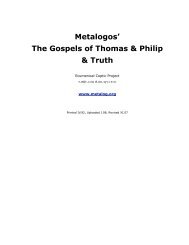Andrew Louth - Syriac Christian Church
Andrew Louth - Syriac Christian Church
Andrew Louth - Syriac Christian Church
You also want an ePaper? Increase the reach of your titles
YUMPU automatically turns print PDFs into web optimized ePapers that Google loves.
186 OPUSCULE 7<br />
84A<br />
C<br />
D<br />
B<br />
the reverent confession of the Fathers. ‘And when he says,<br />
Father, if it be possible, let this cup pass,’ as the great<br />
Athanasius says in his treatise on the Incarnation and the<br />
Trinity, 18 ‘nevertheless not my will be done, but yours. For the<br />
spirit is eager, but the flesh is weak,’ 19 we understand ‘that two<br />
wills are manifest here: the human, which belongs to the flesh,<br />
and the divine. For the human will, because of the weakness<br />
of the flesh, seeks to avoid the passion; the divine will is<br />
eager.’<br />
And this the great theologian, Gregory, clearly teaches in his<br />
second sermon on the Son, when he says, ‘For the willing of<br />
that one 20 is not opposed [to God], 21 but completely deified.’ 22<br />
Thus he possesses a human will, according to this divine<br />
teacher, only it was not opposed to God. 23 But this will is not<br />
at all deliberative, 24 but properly natural, eternally formed<br />
and moved by its essential Godhead to the fulfilment of the<br />
economy. And it is wholly and thoroughly deified by its<br />
agreement and concord with the Father’s will, and can<br />
properly be said to have truly become divine in virtue of the<br />
union, but not by nature. For nothing at all changes its nature<br />
by being deified. When therefore he says ‘completely deified’,<br />
the teacher presents the union of Christ’s human will with the<br />
divine will of the Father, and he completely excludes any<br />
contrariety from the mystery of Christ, as if there were two<br />
beings willing opposing actions. And when he says ‘For the<br />
willing of that one’, he points to the innate movement of<br />
Christ’s human will and its essential and natural difference<br />
from the divine will of the Father, and completely excludes<br />
confusion together with any phantom.<br />
Understanding the meaning of the economy, this divine<br />
Father and together with him the holy teachers of the Catholic<br />
<strong>Church</strong>, fought against this confusion and the equally<br />
irreverent division, and loudly proclaimed the dogma of the<br />
difference and the union in respect of both of them [the wills],<br />
preserving the difference perfectly and in its effects in respect<br />
of the natural logos, and again saving the union, in the<br />
manner of the economy, firmly and hypostatically, so as to<br />
confirm the matters (and everything that naturally goes with<br />
them) that essentially exist in the one and sole Christ God in<br />
accordance with the inseparable union. For just as they all<br />
maintained the dogma that in one and the same there is one<br />
nature and another nature, the divine and the human, and<br />
therefore a double nature, so they loudly preached to all that<br />
there is also one will and another will, the divine and the




